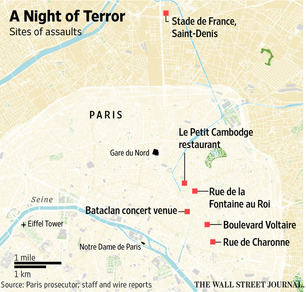|
Of course a leader wants to unite a country against the enemy and show he is not weak: this is all understandable and I sympathise completely. What worries me however is what this “ruthless” “fight against ISIS” will entail because, as raised on BBC Question Time on the 5th of November by journalist Peter Hitchens, it was arguably our Western interventionism in the Middle East that destabilised the region in the first place several decades ago and created the resentful attitude towards us that we fear today. This in turn gave birth to extremist groups on a much bigger scale. What concerns me and several others therefore is that our governments will once again go in with more bombs and guns, fuelling the resentment already evident toward them and us in that region. Airwars, a project by a team of leading journalists, published in the summer (so four months ago), concludes that after 5,700 Western airstrikes on ISIS, 459 non-combatants, including 100 children, had been killed by Western bombs. This number has probably gone up a lot since then. Just like those innocents killed in Paris, the innocents killed by airstrikes also had brothers, sisters, mothers, fathers, husbands and wives; all of whom, just like we have against those who attacked us, probably hold a newfound resentment against those that killed their loved ones and attacked their nation. I am sorry but I fail to see how the killing of innocent civilians is justifiable anywhere in the world: I do not understand how some governments and people think that such major collateral damage on helpless citizens is okay. It makes me wonder whether they think it is okay because the victims look different, speak differently or worship a different god. Or perhaps it’s simply because you can’t hear their screams and cries from half-way around the globe… I would just like to clarify I have absolutely no sympathy or respect for those that carry out any revenge attacks against people; absolutely none. I am equally as disgusted by the murdering of Parisians this weekend as everyone else. What I am saying is that our Western intervention in the Middle East has caused instability in the region and I have sympathy for those who have been unlucky enough to have lived right under the flightpath of a bomber jet. During the summer I had the privilege of attending a talk by Stephen Kinzer. Mr Kinzer is a journalist who now works for the Boston Globe, but was previously a foreign correspondent for the New York Times and was stationed in places where the USA deposed unsympathetic leaders and staged coup d’états. From what I gathered he is very critical of American Foreign policy which he says worsens the stability of a region in the long run because with the majority of their interventions, the consequences have come back to haunt the USA several decades later. This is what the CIA calls “blowback”. He talked about Guatemala, Iran, Afghanistan, Libya and many more episodes of US-led intervention and by now we have all seen the effects of such action. In Guatemala the land reform (Decree 900) was passed by Guatemalan congress in June 1952 and authorised the redistribution of unused land larger than 224 acres to local peasants and compensating land owners with government bonds. The reform, which was aimed to make the country move from the feudal system to a more capitalist system, helped raise the country’s agricultural output and also help the locals find autonomy and dignity. This was seen as hostile by several corporations, including the United Fruit Company. The USA interpreted the transition as a communist threat and hence they initiated the coup d’état of 1954. Due to this coup, a civil war broke out. This shows how here the American intervention led to something much worse and that the politicians on the Hill did not consider the ramifications of a forced coup. Furthermore, Iran is meant to be a country with rich history and culture. It had a democracy until the West funded a coup to remove the leader Mosaddeq because they felt the British owned oil fields were under threat. The CIA ultimately concluded that Iran’s leader had Communist leanings and could not be trusted. Ultimately the blowback was when the US Embassy was occupied by anti-Shah (‘king’) and anti-USA protestors in 1979, ending the mutual Cold War respect. It turned out it was nationalism, not communism, that was the greatest threat to the US’s power in Iran. This replacement of a democratic leader gave the message that the USA did not want democracy. Interestingly, this event is not widely published or talked about, unlike World War II, which has been published extensively. This is because World War II portrayed the west in a fairly good light: marching into a troubled country, and leaving it in a better shape. I don’t want to sound like I dislike America, because really I don’t. America has several strengths that the majority of other countries lack but their foreign policy, along with their allies’ ones, actually do more harm than good on the world stage. Maybe in the short run they do good, but in the long run the consequences are dire. Therefore what concerns me is that the west will rush into things once again by acting in rage and revenge. I think it is as important, if not more so, now as before to take the time to think about the long term consequences of a “ruthless” fight. As we saw in Iraq and Afghanistan, where we had no exit strategy, we could once again leave behind a power vacuum and resentment. If we go into Syria and Iraq in the same way, why won’t it be any different? A perfect example is the Vietnam War. Then, the enemy was the Communists, now it is extremists. Both are reported to have been, and are respectively “threats to our way of life”. When the USA went into Vietnam, they couldn’t win – it was impossible for them. They were unable to cope with Vietcong guerrilla tactics (a tactic later employed by the Taliban) and after their bombing campaigns along the whole Vietnam border with Laos and Cambodia they actually strengthened the anti-American feelings and gave the Vietcong more propaganda. This scenario has been repeated throughout interventionist history all the way through to modern day conflicts, so if we did the same now, why would anything be anything different? Why would we not give people in those countries more of an incentive to join our enemy this time? What makes this situation so much more different to the others? The thing is it will not be any different. Simply by looking at history we can predict what will happen. I hope the governments we elected do the right thing and realise the long-term consequences that could arise long after their final term in office if they do not plan ahead and think carefully. My thoughts are with those affected by the brutal attacks on Paris. I, along with everyone else, am truly horrified by what has happened. We all look on with empathy. Remember, as George Santayana once said: “Those who cannot remember the past are condemned to repeat it.” For those interested in Stephen Kinzer, I recommend his book ‘Overthrow’ which highlights the main events of American foreign policy’s interventions. About the author; Carl is an A-level student in London currently studying politics and economics. The purpose of his blog is simply to serve as a creative outlet; however what he finds most interesting about politics and economics is global engagement and foreign policy; it’s a fascinating branch of politics that is always evolving.
Once Carl has completed his formal education he hopes to become a journalist. Please do not hesitate to contact Carl - thanks!
1 Comment
Eileen
15/11/2015 07:13:48 pm
A thoughtful post - it shows that young and old, and people in general around the world, all want peace but fear that any action taken will make matters worse. We must surely by now have learned from our earlier mistakes Carl?
Reply
Your comment will be posted after it is approved.
Leave a Reply. |
Yourvoice
This blog will include a range of reports and opinion pieces covering many issues. It will be YOUR Voice. Archives
April 2017
Categories
All
|


 RSS Feed
RSS Feed
